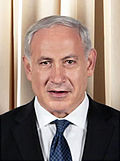This article needs additional citations for verification .(March 2015) |
Netanyahu II cabinet | |
|---|---|
| 32nd Cabinet of Israel | |
 | |
| Date formed | 31 March 2009 |
| Date dissolved | 18 March 2013 |
| People and organisations | |
| Head of state | Shimon Peres |
| Head of government | Benjamin Netanyahu |
| Deputy head of government | Silvan Shalom Moshe Ya'alon Ehud Barak Avigdor Lieberman Dan Meridor Eli Yishai Shaul Mofaz (from 8 May 2012 to 17 July 2012) |
| Member party | Likud Yisrael Beiteinu Shas Labor (until 17 January 2011) The Jewish Home Independence (from 17 January 2011) United Torah Judaism (from 1 April 2009) Kadima (from 8 May 2012 to 17 July 2012) |
| Status in legislature | Grand Coalition (2009–2011) Centre-right (2011–2013) |
| Opposition party | Kadima |
| Opposition leader | Shaul Mofaz |
| History | |
| Election | Knesset elections, 2009 |
| Legislature term | 18th Knesset |
| Predecessor | 31st |
| Successor | 33rd |
The thirty-second government of Israel, also known as the Second Netanyahu Government, [1] was the largest cabinet in the country's history, in terms of the number of ministers: initially containing 30 ministers and nine deputy ministers, it later added another deputy prime minister as of May 2012 until he resigned in July 2012. [2]

